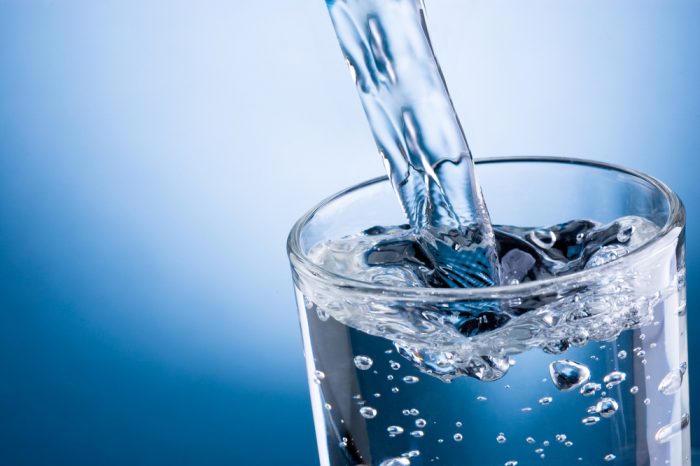
At Lipsey Water, we understand that you care about the water you drink and are here to help you find the healthiest drinking water for you and your family. Water security and purity continue to be a concern for American households, and consumers are paying more attention to where their water comes from. More people continue to transition from tap water to bottled water. However, not all bottled water is the same and it is helpful to know the differences so you can make an informed decision. When looking at different labels and descriptions of water, you might be wondering about the differences between alkaline vs. spring water. Here’s what you need to know about both types of water to help you determine if one is “better” than the other.
What Is Alkaline Water?
Alkaline water is water with a pH greater than 7.0, which is a measurement of water quality. The pH level of alkaline water indicates that the water is less acidic than other types of drinking water. Some believe that alkaline water offers various health benefits, though there is currently limited scientific evidence to support these claims. Alkaline water is typically made by adding minerals such as calcium and potassium to regular water or by using a water ionizer that raises the pH level of the water.
What Are the Benefits of Alkaline Water?
Proponents of alkaline water claim that this type of water can provide a variety of health benefits, including:
- Alkaline water may be helpful in neutralizing acid in the body, which can result in reduced inflammation and improved overall health.
- Alkaline water is also believed to be more easily absorbed by the body, which can improve hydration.
- Some people claim that alkaline water can help remove toxins from the body through the neutralization of acid and improving the function of the liver and kidneys.
- Some athletes claim that drinking alkaline water improves their athletic performance by reducing muscle fatigue and soreness.
It is important to note that these benefits require further research to confirm these potential benefits.
Can You Drink Too Much Alkaline Water?
While there are various claims of potential health benefits of drinking alkaline water, there may also be potential drawbacks to drinking too much. If you drink too much alkaline water, you could potentially upset the body’s natural pH balance. An increase in pH levels could result in a greater risk of forming kidney stones. Alkaline water may also interfere with the effectiveness of certain medications, such as blood pressure and heart medications. At present, there is not enough scientific evidence to support the various health benefits of alkaline water. Furthermore, alkaline water is not recommended as a sole means of treatment or replacement for other medical treatments. You should consult with your healthcare professional before making significant changes to your water consumption, especially if you are taking any medications or have any pre-existing conditions.
What is Spring Water?
Spring water is water that is naturally sourced from an underground formation that flows to the surface. This type of water is considered high quality because it is not exposed to surface contaminants like pollution or industrial runoff and waste. Spring water is typically collected at the source where it emerges from the ground and is directly bottled for consumption. The mineral content of spring water may vary depending on the location of the spring, though it is typically considered purer than other types of drinking water. The United States Food and Drug Administration regulates the labeling and packaging of spring water, which helps ensure this type of water meets specific standards for quality and safety.
Why Should You Drink Spring Water?
Spring water is considered a high-quality source of water for drinking and cooking because of its natural underground source and lack of exposure to surface contaminants. Some potential benefits of drinking spring water include the following:
- Spring water offers naturally rich mineral content, which may include calcium, magnesium, and potassium. These minerals can support your overall health and hydration.
- Spring water is also considered to be pure and free of impurities like chlorine and fluoride, both of which can be found in regular tap water.
- Many people prefer the taste of spring water over tap water or other types of bottled water.
- Spring water is an environmentally-friendly option because it is a renewable resource that can be collected and bottled at the source, reducing the environmental impact.
Are There Health Risks Associated with Spring Water?
It is important to note that not all spring water is of the same quality. The quality of spring water will depend on the location of the source and how it is bottled. There are very few reports of health risks associated with spring water because of its natural source and regulation from the FDA. However, not all bottled water labeled as spring water is truly spring water, so you should always confirm the source and quality of the water before consuming it.
Alkaline vs. Spring Water: Comparing the Two
Both alkaline and spring water can be good sources of hydration and may provide many benefits. Alkaline water is typically made through an artificial process, while spring water has natural alkaline and minerals. In general, alkaline water features fewer nutrients than naturally occurring spring water. When coming from a reputable source, spring water can provide a pure taste without the risk of any added elements or contaminants.
Final Verdict: Which One Is Better for Your Health? Alkaline or Spring Water?
When it comes to choosing the right water for you, it all boils down to personal preference. For a pure, fresh flavor and safely sourced water, choose Lipsey Water’s mountain spring water sourced from the Blue Ridge Mountains in North Carolina. Lipsey Mountain Spring Water offers water delivery services for homes and offices in the Atlanta area, so you can get fresh mountain spring water delivered right to your door.
